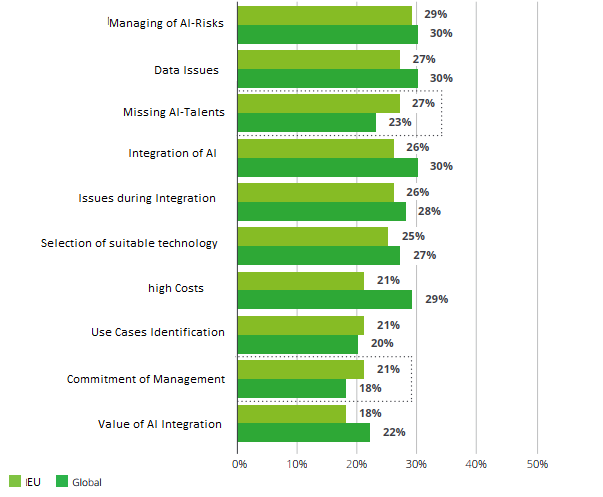Future trends cannot be stopped. The importance and the associated rapid spread of disruptive technologies are increasing more and more. This also applies to the use and corporate integration of AI. Around 80% of all medium-sized to large companies see artificial intelligence as one of the essential factors for future business success and adequate competitiveness. Instead Artificial intelligence now becomes mainstream technology. Competencies in the area of the four AI core technologies are a must and for larger ones Indispensable for companies. Based on the current situation economical world is facing a lot of Challenges and Chances of Artificial Intelligence (AI) in Europe and World.
But before we dive deeper into challenges of AI, which technologies and approaches are actually considered as part of AI. Globally as well as in Europe, AI essentially contains of the following technological approaches: machine learning, deep learning, natural language processing and computer vision.

Potentials of Artificial Intelligence
The use of artificial intelligence is possible for very many areas and is actually already practiced in many areas. However, the functional scope of the AI technologies, which are currently integrated all over the busisness world, is not balanced. So mainly the AI-techniologies are integrated within the IT departments and functional areas of company. There is great potential in terms of the areas of possible integration of AI within the corporate environment

The reason for a weak spread of AI-technology is the unsufficient number of AI-Talents available. Thus the most companies tend to buy-decision instead of built-decision. Especially AI-as-a-Service (AIaaS) is a common one in EU Implementation approach. The reasons for its popularity in this country are diverse: AIaaS enables successful implementation of artificial intelligence too with less developed skills and knowledge within companies. Likewise, AI becomes AIaaS in many cases also where it makes economic sense pure in-house developments are not worthwhile. Finally, the as-a-service concept also enables smaller companies to participate to participate in the possibilities of artificial intelligence. Given the great benefit of AI and using the economy of scope while driving the AIaaS approach the ROI into the integration of the AI is under 2 years for most of the companies.

Based on the described potentials and opportunities of AI and its future importance in the economy, the winners will be the companies that are already investing in AI consulting, development and integration.
Challenges of AI
Regardless of the many potentials of AI, there are of course currently also challenges that need to be overcome.

Not only missing AI-Talents and commitment of the management level seem to be delaying the development of AI. There are also risks associated with the integration of AI. Basically 3 risk areas to be named here: the missing transparency of AI-based decisions, concern about systematic, unfair distortions caused by the algorithms used (“algorithmic bias”) and fears about job losses.
When managing corresponding uncertainties there is still some catching up to do. Various instruments and methods can be used to address the uncertainties and risks. For example, internal and external audits and testing of AI systems are necessary to verify the consistency of the data and compliance with state data protection laws. This goes hand in hand with the establishment of risk policies and control boards. Since the know-how is not yet widespread in the company’s internal landscape, training is necessary to counteract this. It is clear that for many companies a strong connection and work with external consultants and experts is indispensable. Here, too, it makes sense to point out the great economic potential of companies that are already focusing on corresponding services.

